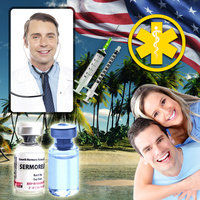
Introduction to Hormonal Dynamics in Bodybuilding
Bodybuilding is not just about lifting weights and building muscle. It's a complex interplay of diet, exercise, and crucially, hormonal balance. Hormones such as testosterone, growth hormone (GH), and cortisol play significant roles in determining how effectively you can gain muscle and lose fat. Understanding these can enhance both performance and health outcomes.
The Role of Testosterone and Growth Hormone
Testosterone, the primary male sex hormone, is pivotal in promoting muscle mass and strength. It enhances protein synthesis, facilitates muscle recovery, and significantly impacts fat distribution. Growth hormone, similarly, supports muscle growth and regeneration. It also helps to mobilize fat stores, making it essential for body composition. Both hormones are naturally boosted by exercises like weightlifting, particularly heavy and compound movements, such as squats and deadlifts.
However, the relationship between bodybuilding and hormonal levels isn't straightforward. Excessive training can lead to hormonal imbalances, particularly if not paired with adequate rest and nutrition. Overtraining can elevate cortisol levels, a stress hormone that breaks down muscle tissue and can counteract the anabolic effects of testosterone and GH.
Nutritional Impacts on Hormonal Health
Nutrition plays a crucial role in hormonal health. Diets too low in fat may impair testosterone production since cholesterol is a building block for testosterone. Conversely, excessive caloric surpluses can increase body fat, which may lead to elevated estrogen levels, potentially diminishing testosterone's effectiveness.
Proper nutrition should include a balanced intake of proteins, fats, and carbohydrates, tailored to the individual's bodybuilding goals and needs. Micronutrients, such as zinc and vitamin D, are also vital, as deficiencies in these can lead to decreased testosterone production.
Supplements and Hormonal Enhancement
The market is flooded with supplements claiming to boost testosterone and GH levels. While some, like vitamin D, zinc, and omega-3 fatty acids, have a basis in supporting hormonal health, many testosterone boosters lack scientific support. American men are advised to approach these products with skepticism and to consult healthcare providers before starting any new supplement regimen.
Psychological and Environmental Factors
Stress management is crucial in maintaining hormonal balance. Chronic stress elevates cortisol, which not only diminishes testosterone but also has broader negative health impacts. Techniques such as meditation, adequate sleep, and time management can help mitigate stress levels.
Environmental factors, including exposure to endocrine-disrupting chemicals like BPA, found in some plastics, can also affect testosterone levels. Awareness and avoidance of these chemicals where possible can contribute to better hormonal health.
Regular Monitoring and Professional Guidance
Given the complexities of hormonal balance and its impact on bodybuilding, regular medical check-ups are advisable. Blood tests can monitor hormone levels and help tailor diet and exercise regimes more accurately. Consulting with endocrinologists or other specialists in sports medicine can also provide insights tailored to individual health needs and fitness goals.
Conclusion: A Balanced Approach to Bodybuilding
In conclusion, successful bodybuilding for American men involves more than just physical training. It requires a holistic approach that includes careful attention to hormonal health, nutrition, psychological well-being, and environmental factors. By understanding and managing these elements, bodybuilders can optimize their performance, achieve their aesthetic goals, and maintain good health in the process.
Contact Us For A Fast And Professional Response

- Bodybuilding: A Strategic Health Solution for Obesity and Metabolic Syndrome in American Males [Last Updated On: February 23rd, 2025] [Originally Added On: February 23rd, 2025]
- Unveiling the Secrets of Longevity Through Body Building: A Geriatric Perspective [Last Updated On: February 23rd, 2025] [Originally Added On: February 23rd, 2025]
- Empowering the Mind Through Muscles: Leveraging Body Building For Mental Health Optimization [Last Updated On: March 2nd, 2025] [Originally Added On: March 2nd, 2025]
- Enhancing Bodybuilding Performance and Injury Prevention: The Critical Role of Physical Therapy [Last Updated On: March 3rd, 2025] [Originally Added On: March 3rd, 2025]
- Essential Nutritional Strategies for Effective Bodybuilding [Last Updated On: March 4th, 2025] [Originally Added On: March 4th, 2025]
- Optimizing Body Building: Enhancing Health and Performance through Training and Nutrition [Last Updated On: March 5th, 2025] [Originally Added On: March 5th, 2025]
- Bodybuilding's Role in Preventing Cardiovascular Disease in American Men [Last Updated On: March 6th, 2025] [Originally Added On: March 6th, 2025]
- Exploring the Synergy Between Bodybuilding and Diabetes Management in American Males [Last Updated On: March 7th, 2025] [Originally Added On: March 7th, 2025]
- Orthopedic Health Strategies for Bodybuilders: Prevent Injuries, Promote Recovery, Optimize Performance [Last Updated On: March 7th, 2025] [Originally Added On: March 7th, 2025]
- The Risks of Steroid Use in Bodybuilding: A Comprehensive Health Warning [Last Updated On: March 8th, 2025] [Originally Added On: March 8th, 2025]
- Unveiling the Psychological Benefits of Bodybuilding for American Males [Last Updated On: March 12th, 2025] [Originally Added On: March 12th, 2025]
- The Impact of Bodybuilding on Sleep: Patterns and Quality in American Males [Last Updated On: March 13th, 2025] [Originally Added On: March 13th, 2025]
- Exploring Body Building as a Therapeutic Intervention for Chronic Pain in American Males [Last Updated On: March 15th, 2025] [Originally Added On: March 15th, 2025]
- Bodybuilding: A Strategic Approach to Managing Hypertension in American Males [Last Updated On: March 17th, 2025] [Originally Added On: March 17th, 2025]
- Preventing Injuries in Bodybuilding: Techniques, Recovery, and Professional Guidance [Last Updated On: March 17th, 2025] [Originally Added On: March 17th, 2025]
- Safe Body Building for American Males: Debunking Myths and Embracing Facts [Last Updated On: March 17th, 2025] [Originally Added On: March 17th, 2025]
- Optimizing Post-Surgical Recovery in American Males with Bodybuilding Techniques: A Physician's Guide [Last Updated On: March 18th, 2025] [Originally Added On: March 18th, 2025]
- Bodybuilding Boosts Immune Health: A Guide for American Men [Last Updated On: March 19th, 2025] [Originally Added On: March 19th, 2025]
- Bodybuilding's Impact on Male Endocrine Health: Hormonal Balance and Risks [Last Updated On: March 19th, 2025] [Originally Added On: March 19th, 2025]
- Body Building: A Therapeutic Approach to Stress and Anxiety in American Males [Last Updated On: March 20th, 2025] [Originally Added On: March 20th, 2025]
- Health Risks of Competitive Bodybuilding for American Males: A Comprehensive Overview [Last Updated On: March 20th, 2025] [Originally Added On: March 20th, 2025]
- Bodybuilding's Role in Addiction Recovery for American Males: Physical and Psychological Benefits [Last Updated On: March 20th, 2025] [Originally Added On: March 20th, 2025]
- Bodybuilding and Kidney Health: Safe Practices for American Males [Last Updated On: March 20th, 2025] [Originally Added On: March 20th, 2025]
- Bodybuilding as a Strategy to Combat Lifestyle Diseases in American Males [Last Updated On: March 21st, 2025] [Originally Added On: March 21st, 2025]
- Bodybuilding: A Holistic Approach to Health for American Males [Last Updated On: March 21st, 2025] [Originally Added On: March 21st, 2025]
- Orthostatic Hypotension Risks and Management for American Male Bodybuilders [Last Updated On: March 21st, 2025] [Originally Added On: March 21st, 2025]
- Body Building Enhances Gut Health in American Males: A Clinical Perspective [Last Updated On: March 21st, 2025] [Originally Added On: March 21st, 2025]
- Body Building Enhances Lung Health: Exercises, Breathing, and Nutrition for American Males [Last Updated On: March 22nd, 2025] [Originally Added On: March 22nd, 2025]
- Pediatric Bodybuilding: Balancing Growth, Development, and Fitness in Young Males [Last Updated On: March 22nd, 2025] [Originally Added On: March 22nd, 2025]
- Bodybuilding's Impact on Heart Health: Risks and Cardiologist Insights [Last Updated On: March 22nd, 2025] [Originally Added On: March 22nd, 2025]
- Bodybuilding's Impact on Prostate Health: Hormones, Supplements, and Diet [Last Updated On: March 22nd, 2025] [Originally Added On: March 22nd, 2025]
- Metabolic Effects of Bodybuilding: Insights for American Males [Last Updated On: March 23rd, 2025] [Originally Added On: March 23rd, 2025]
- Asthma and Bodybuilding: Safety, Benefits, and Tailored Strategies for American Males [Last Updated On: March 23rd, 2025] [Originally Added On: March 23rd, 2025]
- Debunking Menstrual Cycle Myths in Bodybuilding: A Scientific Perspective for American Males [Last Updated On: March 23rd, 2025] [Originally Added On: March 23rd, 2025]
- Sickle Cell Disease and Body Building: Benefits, Risks, and Safe Practices for American Males [Last Updated On: March 23rd, 2025] [Originally Added On: March 23rd, 2025]
- Body Building Benefits for American Males with Parkinson's Disease [Last Updated On: March 23rd, 2025] [Originally Added On: March 23rd, 2025]
- Body Building's Role in Managing Male Menopause: Enhancing Health and Vitality [Last Updated On: March 24th, 2025] [Originally Added On: March 24th, 2025]
- Bodybuilding Benefits for American Men with Rheumatoid Arthritis: A Tailored Approach [Last Updated On: March 24th, 2025] [Originally Added On: March 24th, 2025]
- Bodybuilding: A Strategic Approach to Prevent Musculoskeletal Disorders in American Males [Last Updated On: March 24th, 2025] [Originally Added On: March 24th, 2025]
- Bodybuilding's Role in Managing Chronic Degenerative Diseases for American Males [Last Updated On: March 24th, 2025] [Originally Added On: March 24th, 2025]
- Liquid Diets in Bodybuilding: Benefits, Risks, and Medical Insights [Last Updated On: March 25th, 2025] [Originally Added On: March 25th, 2025]
- Bodybuilding: A Therapeutic Approach to Mood Disorders in American Males [Last Updated On: March 25th, 2025] [Originally Added On: March 25th, 2025]
- Bodybuilding as a Therapeutic Strategy for Managing PTSD in American Males [Last Updated On: March 25th, 2025] [Originally Added On: March 25th, 2025]
- Bodybuilding Enhances Postnatal Recovery for New American Fathers: Physical and Psychological Benefits [Last Updated On: March 26th, 2025] [Originally Added On: March 26th, 2025]
- Bodybuilding's Psychological Impact on American Teenage Males: Benefits and Risks [Last Updated On: March 26th, 2025] [Originally Added On: March 26th, 2025]
- Bodybuilding and Dementia Risk: Insights for American Males [Last Updated On: March 26th, 2025] [Originally Added On: March 26th, 2025]
- Bodybuilding: A Proactive Approach to Combat Age-Related Muscle Loss in American Males [Last Updated On: March 26th, 2025] [Originally Added On: March 26th, 2025]
- Bodybuilding Reduces Colon Cancer Risk in American Males: A Comprehensive Guide [Last Updated On: March 26th, 2025] [Originally Added On: March 26th, 2025]
- Genetic Factors in Bodybuilding: Tailoring Training and Nutrition for American Males [Last Updated On: March 26th, 2025] [Originally Added On: March 26th, 2025]
- Essential Vitamins and Supplements for American Male Bodybuilders: A Medical Review [Last Updated On: March 27th, 2025] [Originally Added On: March 27th, 2025]
- Essential Safety Precautions for American Male Bodybuilders [Last Updated On: March 27th, 2025] [Originally Added On: March 27th, 2025]
- Bodybuilding Boosts Immune Health: A Comprehensive Guide for American Men [Last Updated On: March 27th, 2025] [Originally Added On: March 27th, 2025]
- Bodybuilding: A Natural Approach to Managing Arthritis in American Males [Last Updated On: March 27th, 2025] [Originally Added On: March 27th, 2025]
- Body Building Benefits for COPD Patients: Enhancing Health and Quality of Life [Last Updated On: March 27th, 2025] [Originally Added On: March 27th, 2025]
- Body Building: A Comprehensive Anti-Aging Strategy for American Males [Last Updated On: March 27th, 2025] [Originally Added On: March 27th, 2025]
- Bodybuilding Boosts Recovery for American Males Post-Chemotherapy [Last Updated On: March 27th, 2025] [Originally Added On: March 27th, 2025]
- Bodybuilding Boosts Mental Resilience in American Males: Discipline, Community, and Growth [Last Updated On: March 27th, 2025] [Originally Added On: March 27th, 2025]
- Bodybuilding Boosts Cognitive Health: Benefits for American Men [Last Updated On: March 28th, 2025] [Originally Added On: March 28th, 2025]
- Injury Prevention and Management Strategies for American Male Bodybuilders [Last Updated On: March 28th, 2025] [Originally Added On: March 28th, 2025]
- Bodybuilding Boosts Bone Density in American Males: Benefits and Balanced Approaches [Last Updated On: March 28th, 2025] [Originally Added On: March 28th, 2025]
- Body Building's Impact on Heart Health for American Males: Benefits and Risks [Last Updated On: March 29th, 2025] [Originally Added On: March 29th, 2025]
- Hydration Guidelines for American Male Bodybuilders: Enhancing Performance and Recovery [Last Updated On: March 30th, 2025] [Originally Added On: March 30th, 2025]
- Bodybuilding Boosts Metabolism: Muscle Mass, RMR, and Thermogenesis in American Males [Last Updated On: March 31st, 2025] [Originally Added On: March 31st, 2025]
- Bodybuilding's Dual Impact on Life Expectancy in American Males: Benefits and Risks [Last Updated On: April 1st, 2025] [Originally Added On: April 1st, 2025]
- Medically Supervised Body Building: A Safe Path to Weight Management for American Males [Last Updated On: April 1st, 2025] [Originally Added On: April 1st, 2025]
- Bodybuilding's Impact on Hormones in American Males: Benefits and Risks [Last Updated On: April 1st, 2025] [Originally Added On: April 1st, 2025]
- Bodybuilding Boosts Cardiovascular Health: A Comprehensive Guide for American Males [Last Updated On: April 5th, 2025] [Originally Added On: April 5th, 2025]
- Bodybuilding: A Non-Pharmacological Approach to Stress Management in American Males [Last Updated On: April 7th, 2025] [Originally Added On: April 7th, 2025]
- Stretching Essentials for American Male Bodybuilders: Enhancing Performance and Health [Last Updated On: April 7th, 2025] [Originally Added On: April 7th, 2025]
- Bodybuilding Enhances Recovery in American Males Post-Joint Replacement Surgery [Last Updated On: April 8th, 2025] [Originally Added On: April 8th, 2025]
- Gut Health's Crucial Role in Enhancing Bodybuilding Performance for American Males [Last Updated On: April 8th, 2025] [Originally Added On: April 8th, 2025]
- Bodybuilding and Flexibility: Enhancing Performance and Health for American Males [Last Updated On: April 9th, 2025] [Originally Added On: April 9th, 2025]
- Bodybuilding: A Holistic Approach to Managing ADHD in American Males [Last Updated On: April 11th, 2025] [Originally Added On: April 11th, 2025]
- Bodybuilding and Back Pain: Chiropractic Insights and Preventive Strategies [Last Updated On: April 12th, 2025] [Originally Added On: April 12th, 2025]
- Guidelines for Safe Bodybuilding During Pregnancy: A Support Guide for American Males [Last Updated On: April 12th, 2025] [Originally Added On: April 12th, 2025]
- Vegetarian Bodybuilding: Meeting Protein Needs for American Male Athletes [Last Updated On: April 12th, 2025] [Originally Added On: April 12th, 2025]
- Bodybuilding Regimen to Prevent Low Back Pain in American Males [Last Updated On: April 12th, 2025] [Originally Added On: April 12th, 2025]
- Overexertion Risks in Bodybuilding: Safe Training Strategies for American Males [Last Updated On: April 13th, 2025] [Originally Added On: April 13th, 2025]
- Bodybuilding as a Therapeutic Approach to Managing Sciatica in American Males [Last Updated On: April 13th, 2025] [Originally Added On: April 13th, 2025]

















